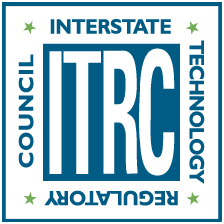Appendix B. State Survey and State Survey Results
In the fall of 2019, the SRR team conducted a state survey. The survey asked for information on green and sustainable regulations, policies, guidance; and activities; extreme weather and fire events; and information on what resources would be helpful to the state. The team received 52 responses to the survey. The survey instrument is presented in section B.1 and the results are presented section B.2.
B.1 State Survey
GSR & Resiliency State Priorities Survey
The ITRC Green and Sustainable Remediation with Resiliency to Extreme Weather Event and Wildfires Team (GSR/R) has just begun updating the 2011 GSR guidance to support sustainable, resilient remediation and redevelopment of contaminated sites.
States’ needs are foremost and your response to this survey will guide how we develop resources for you.
For further background please review the Team Page and the associated fact sheet, both found HERE.
GSR is the site-specific employment of products, processes, technologies, and procedures that mitigate contaminant risk to receptors while making decisions that are cognizant of balancing community goals, economic impacts, and environmental effects.
Extreme weather events (such as heat waves, droughts, tornadoes, and hurricanes) are defined as lying in the outermost (“most unusual”) 10 percent of a place’s history. Analyses are available at the national and regional levels.
Resilience is the capacity of a community, business, or natural environment to prevent, withstand, respond to, and recover from a disruption.
SURVEY PERIOD: October 8, 2019 through November 6, 2019
If you have any questions, please contact the Team’s Program Advisor, Barbara Maco ([email protected])
1. Please provide your contact information:
| Name: | |
| State and Department: | |
| Job Title: | |
| Email Address: | |
| Phone Number: |
2. Does your state have any existing GSR regulation, policy, or guidance? (See GSR definition above)
If YES, please provide the reference/link:
3. Check all of the following extreme weather/climate or wildfire events that have or might impact your state. Please note any related impact such as increased/decreased stormwater runoff in the comment box.
4. At which stages is your state planning for resiliency to address extreme weather events and wildfires? If you have NONE, please put NA in the category box. If YES, please provide a reference and/or web link.
Assessment / Identification:
State-Managed Climate Change Information Clearinghouse or Data Resource:
State Agency or Department Lead:
Comprehensive Plan:
Executive Order:
Regulation / Statue:
Other (please specify):
5. Does your state have any policy, strategy, regulatory framework, requirements, or guidance for addressing the impacts of extreme weather events and wildfires at remediation sites, both active and closed?
If YES, please provide a reference/link. If NO, is your state planning on this in the future?
6. Does your state have an emergency response plan for extreme weather events and wildfire impacts at contaminated sites?
7. Has your state seen GSR applied in any of the following site cleanup programs? Provide key information in comment section.
Please note key elements of implementation here.
8. What are the GSR implementation barriers for your state? Please note what they are in the comment box below.
List the barriers
9. Rate the following items that might lead to a more sustainable resilient remediation and redevelopment in your state.
| Rating | |
| State or Federal legislation/regulatory mandate | |
| State or Federal grant incentives | |
| Local permits, regulations, or ordinances | |
| Private certification (e.g. LEED, Envision) | |
| Land use/institutional controls |
10. Metrics provide a basis for evaluating actions being considered throughout the site cleanup and redevelopment process and can apply to more than one component of GSR… environmental, economic and or social. Please indicate if these metrics have been used at cleanup projects in your state or their potential value for future cleanups.
| Rating | |
| Environmental metrics (greenhouse gas emissions created or energy consumed) | |
| Economic metrics (such as job creation/preservation) | |
| Social metrics (parkland or open space created) |
11. Does your state recommend/encourage GSR best management practices (BMPs) at contaminated site cleanup and redevelopment.
12. What types of BMP resources would your state like to see in the ITRC GSR/R guidance?
Remedial technology/approach evaluation (such as a feasibility study)
13. Would a sustainable remediation guidance/framework that also addresses extreme weather events and wildfire impacts at contaminated sites be useful for your state?
14. Rate each case study topic based on its usefulness to support sustainable resilient remediation and redevelopment implementation in your state.
| Rating | |
| technology/approach evaluation (such as a feasibility study) | |
| technology/approach optimization | |
| technology/approach implementation | |
| Return on investment, including cost of externalities (e.g. social cost of carbon, ecosystem services) | |
| Regulator collaboration and/or support | |
| Community engagement with the impacted public | |
| Stakeholder engagement to define sustainability metrics and tools | |
| Risk management | |
| Water conservation and reuse | |
| Materials use/management | |
| Circular economy |
Other (please specify):
15. Does your state have any case studies/site examples that could be included in the ITRC GSR/Resiliency guidance?
16. Do you have any additional feedback that you would like to provide to help the ITRC GSR/R Team develop its guidance and other resources?
B.2 State Survey Results
Q1 Please provide your contact information:
Answered: 52, Skipped: 0
| ANSWER CHOICES | RESPONSES | ||
| Name: | 100.00% | 52 | |
| State and Department: | 100.00% | 52 | |
| Job Title: | 92.31% | 48 | |
| Email Address: | 100.00% | 52 | |
| Phone Number: | 98.08% | 51 | |
Q2 Does your state have any existing GSR regulation, policy, or guidance? (See GSR definition above)
Answered: 52 Skipped: 0
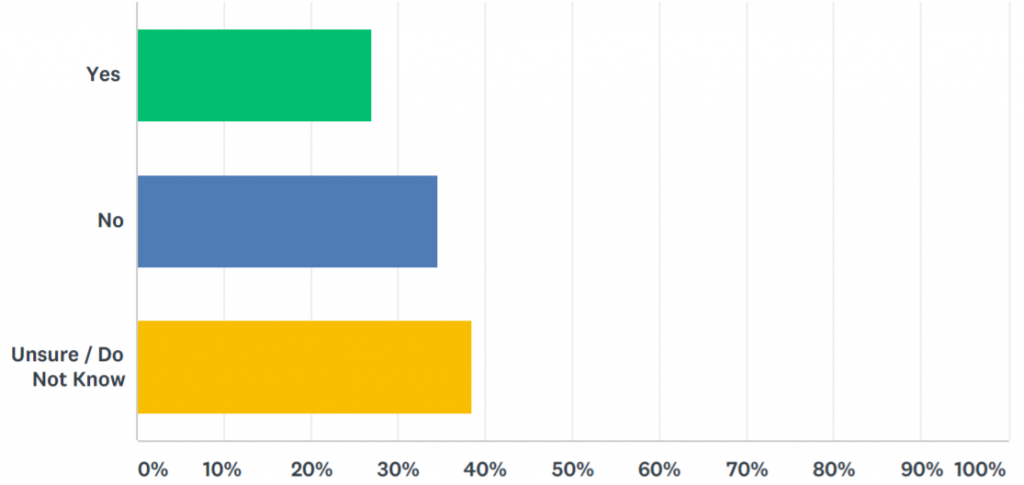
| ANSWER CHOICES | RESPONSES | ||
| Yes | 26.92% | 14 | |
| No | 34.6% | 18 | |
| Don’t know/Unsure | 38.4% | 20 | |
| TOTAL | 52 | ||
Q3 Check all of the following extreme weather/climate or wildfire events that have or might impact your state. Please note any related impact such as increased/decreased stormwater runoff in the comment box.
Answered: 50 Skipped: 2
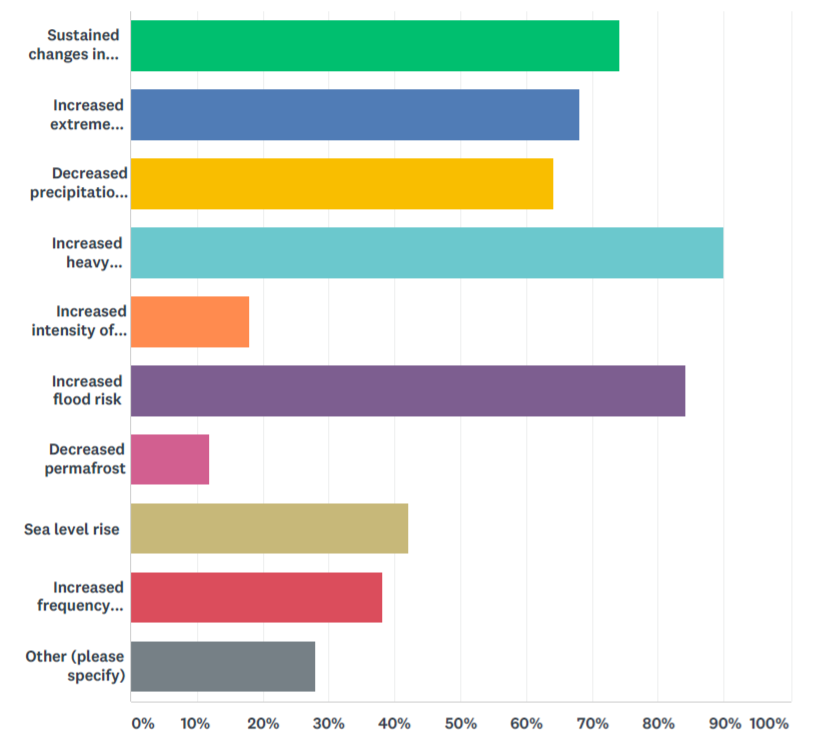
| ANSWER CHOICES | RESPONSES | ||
| Sustained changes in average temperature | 74.00% | 37 | |
| Increased extreme temperatures | 68.00% | 34 | |
| Decreased precipitation days, increasing drought intensity | 64.00% | 32 | |
| Increased heavy precipitation events | 90.00% | 45 | |
| Increased intensity of hurricanes | 18.00% | 9 | |
| Increased flood risk | 84.00% | 42 | |
| Decreased permafrost | 12.00% | 6 | |
| Sea level rise | 42.00% | 21 | |
| Increased frequency and/or intensity of wildfires | 38.00% | 19 | |
| Other (please specify) | 28.00% | 14 | |
| Total Respondents: | 50 | ||
Q4 At which stages is your state planning for resiliency to address extreme weather events and wildfires? If you have NONE, please put NA in the category box. If YES, please provide a reference and/or web link.
Answered: 50 Skipped: 2
| ANSWER CHOICES | RESPONSES | ||
| Assessment / Identification: | 84.00% | 42 | |
| State-Managed Climate Change Information Clearinghouse or Data Resource: | 76.00% | 38 | |
| State Agency or Department Lead: | 66.00% | 33 | |
| Comprehensive Plan: | 62.00% | 31 | |
| Executive Order: | 62.00% | 31 | |
| Regulation / Statue: | 56.00% | 28 | |
| Other (please specify): | 32.00% | 16 | |
Q5 Does your state have any policy, strategy, regulatory framework, requirements, or guidance for addressing the impacts of extreme weather events and wildfires at remediation sites, both active and closed?
Answered: 51 Skipped: 1
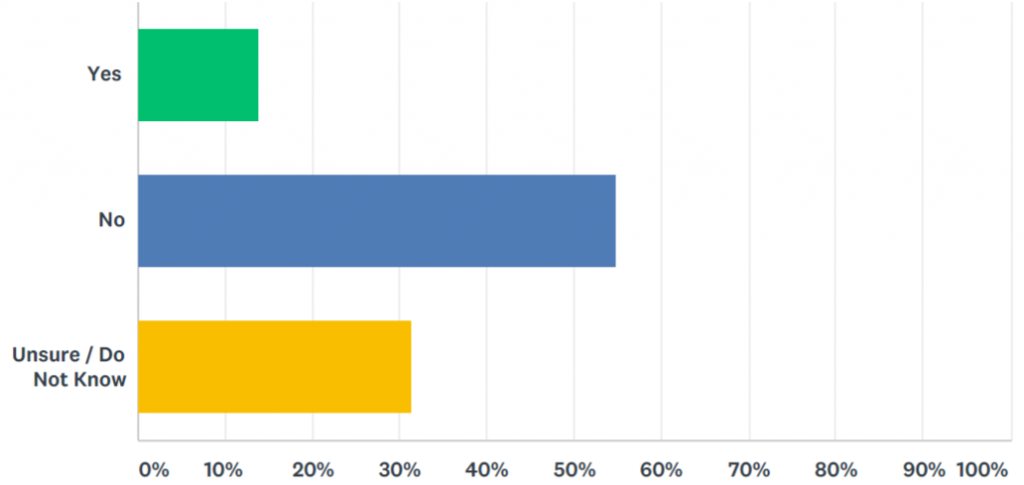
| ANSWER CHOICES | RESPONSES | ||
| Yes | 13.73% | 7 | |
| No | 54.90% | 28 | |
| Unsure / Do Not Know | 31.37% | 16 | |
| TOTAL | 51 | ||
Q6 Does your state have an emergency response plan for extreme weather events and wildfire impacts at contaminated sites?
Answered: 52 Skipped: 0
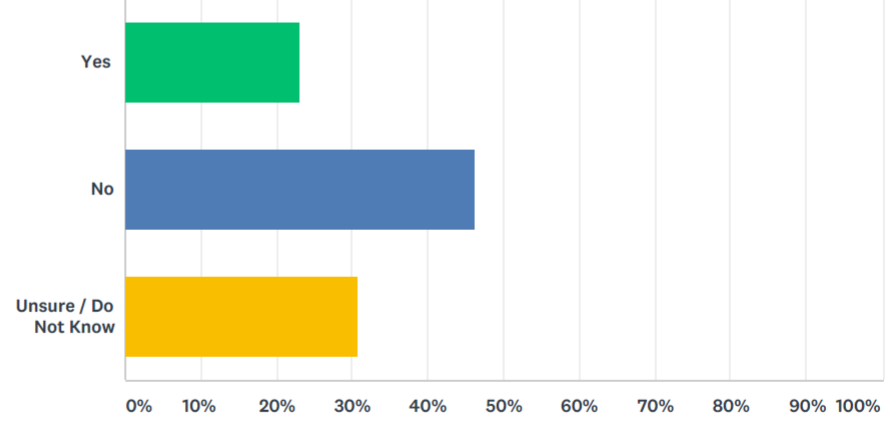
| ANSWER CHOICES | RESPONSES | ||
| Yes | 23.08% | 12 | |
| No | 46.15% | 24 | |
| Unsure / Do Not Know | 30.77% | 16 | |
| TOTAL | 52 | ||
Q7 Has your state seen GSR applied in any of the following site cleanup programs? Provide key information in comment section.
Answered: 31 Skipped: 21
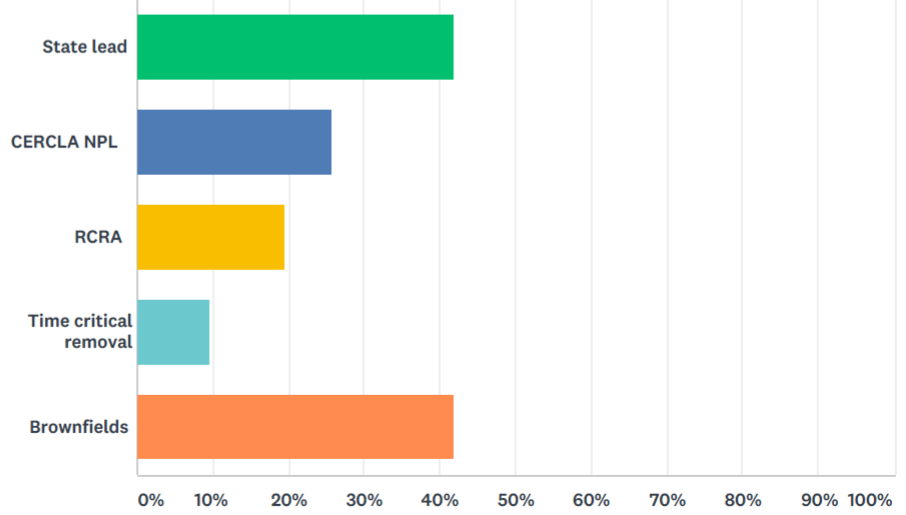
| ANSWER CHOICES | RESPONSES | ||
| State lead | 41.94% | 13 | |
| CERCLA NPL | 25.81% | 8 | |
| RCRA | 19.35% | 6 | |
| Time critical removal | 9.68% | 3 | |
| Brownfields | 41.94% | 13 | |
| Total Respondents: | 31 | ||
Q8 What are the GSR implementation barriers for your state? Please note what they are in the comment box below.
Answered: 46 Skipped: 6
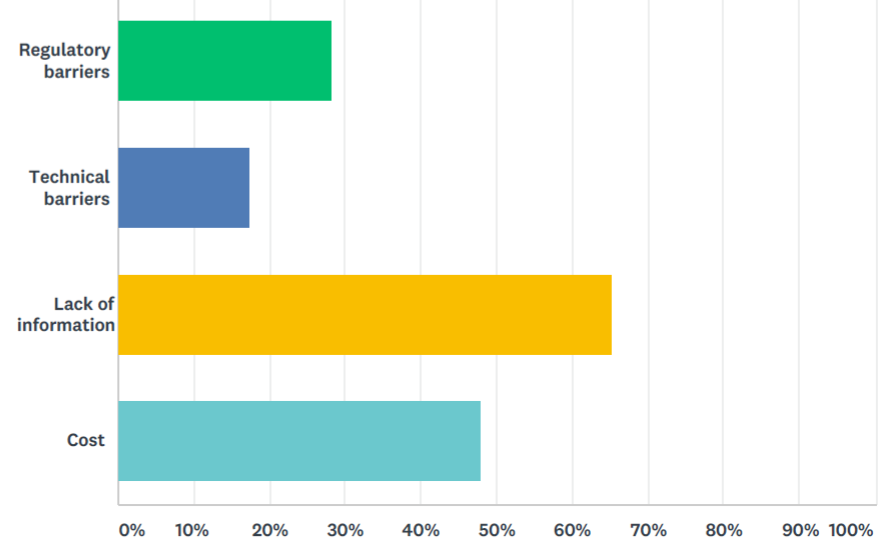
| ANSWER CHOICES | RESPONSES | ||
| Regulatory barriers | 28.26% | 13 | |
| Technical barriers | 17.39% | 8 | |
| Lack of information | 65.22% | 30 | |
| Cost | 47.83% | 22 | |
| Total Respondents: | 46 | ||
Q9 Rate the following items that might lead to a more sustainable resilient remediation and redevelopment in your state.
Answered: 48 Skipped: 4
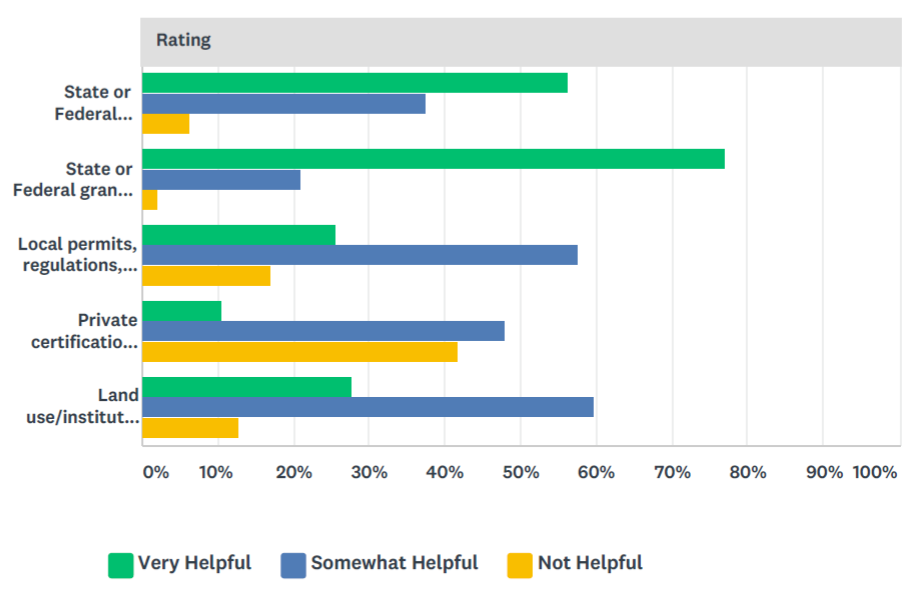
| Rating | VERY HELPFUL | SOMEWHAT HELPFUL | NOT HELPFUL | TOTAL |
| State or Federal legislation/regulatory mandate | 56.25% 27 |
37.50% 18 |
6.25% 3 |
48 |
| State or Federal grant incentives | 77.08% 37 |
20.83% 10 |
2.08% 1 |
48 |
| Local permits, regulations, or ordinances | 25.53% 12 |
57.45% 27 |
17.02% 8 |
47 |
| Private certification (e.g. LEED, Envision) | 10.42% 5 |
47.92% 23 |
41.67% 20 |
48 |
| Land use/institutional controls | 27.66% 13 |
59.57% 28 |
12.77% 6 |
47 |
Q10 Metrics provide a basis for evaluating actions being considered throughout the site cleanup and redevelopment process and can apply to more than one component of GSR… environmental, economic and or social. Please indicate if these metrics have been used at cleanup projects in your state or their potential value for future cleanups.
Answered: 45 Skipped: 7
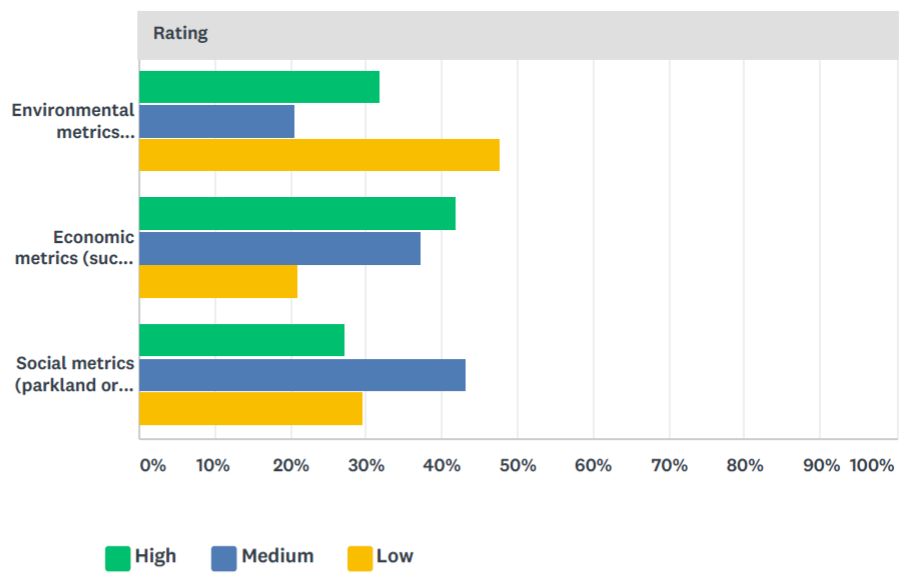
| Rating | High | Medium | Low | Total |
| Environmental metrics (greenhouse gas emissions created or energy consumed) | 31.82% 14 |
20.45% 9 |
47.73% 21 |
44 |
| Economic metrics (such as job creation/preservation) | 41.86% 18 |
37.21% 16 |
20.93% 9 |
43 |
| Social metrics (parkland or open space created) | 27.27% 12 |
43.18% 19 |
29.55% 13 |
44 |
Q11 Does your state recommend/encourage GSR best management practices (BMPs) at contaminated site cleanup and redevelopment.
Answered: 51 Skipped: 1
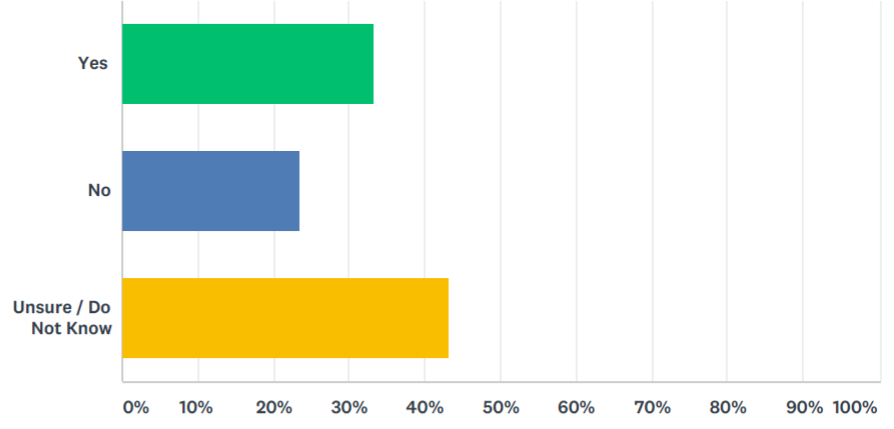
| ANSWER CHOICES | RESPONSES | ||
| Yes | 33.33% | 17 | |
| No | 23.53% | 12 | |
| Unsure / Do Not Know | 43.14% | 22 | |
| TOTAL | 51 | ||
Q12 What types of BMP resources would your state like to see in the ITRC GSR/R guidance?
Answered: 49 Skipped: 3
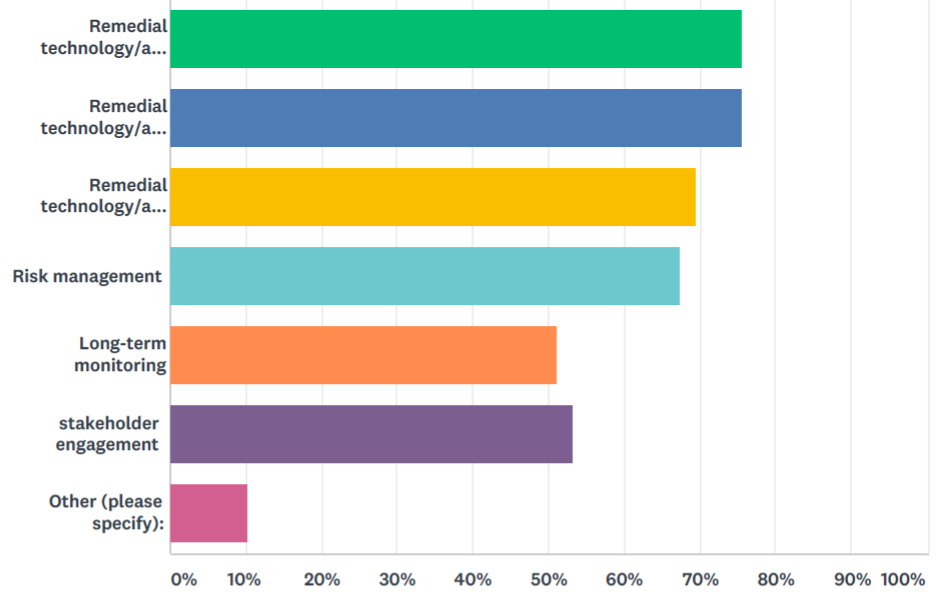
| ANSWER CHOICES | RESPONSES | ||
| Remedial technology/approach evaluation (such as a feasibility study) | 75.51% | 37 | |
| Remedial technology/approach optimization | 75.51% | 37 | |
| Remedial technology/approach implementation | 69.39% | 34 | |
| Risk management | 67.35% | 33 | |
| Long-term monitoring | 51.02% | 25 | |
| stakeholder engagement | 53.06% | 26 | |
| Other (please specify): | 10.20% | 5 | |
| Total Respondents: | 49 | ||
Q13 Would a sustainable remediation guidance/framework that also addresses extreme weather events and wildfire impacts at contaminated sites be useful for your state?
Answered: 51 Skipped: 1
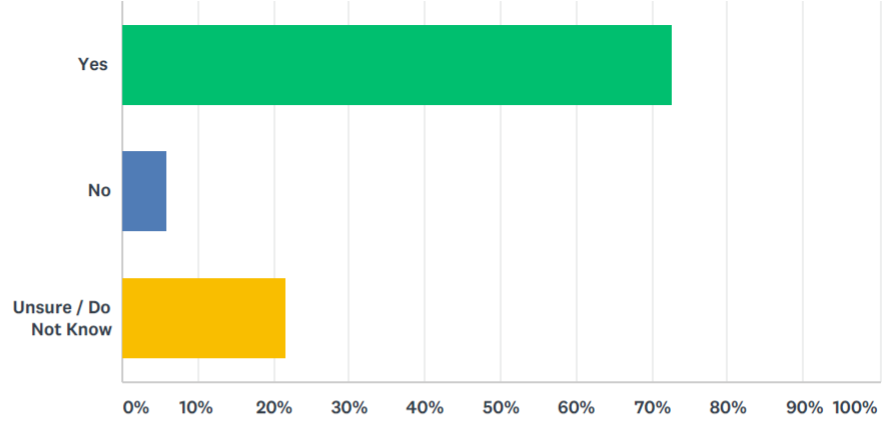
| ANSWER CHOICES | RESPONSES | ||
| Yes | 72.55% | 37 | |
| No | 5.88% | 3 | |
| Unsure / Do Not Know | 21.57% | 11 | |
| TOTAL | 51 | ||
Q14 Rate each case study topic based on its usefulness to support sustainable resilient remediation and redevelopment implementation in your state.
Answered: 48 Skipped: 4
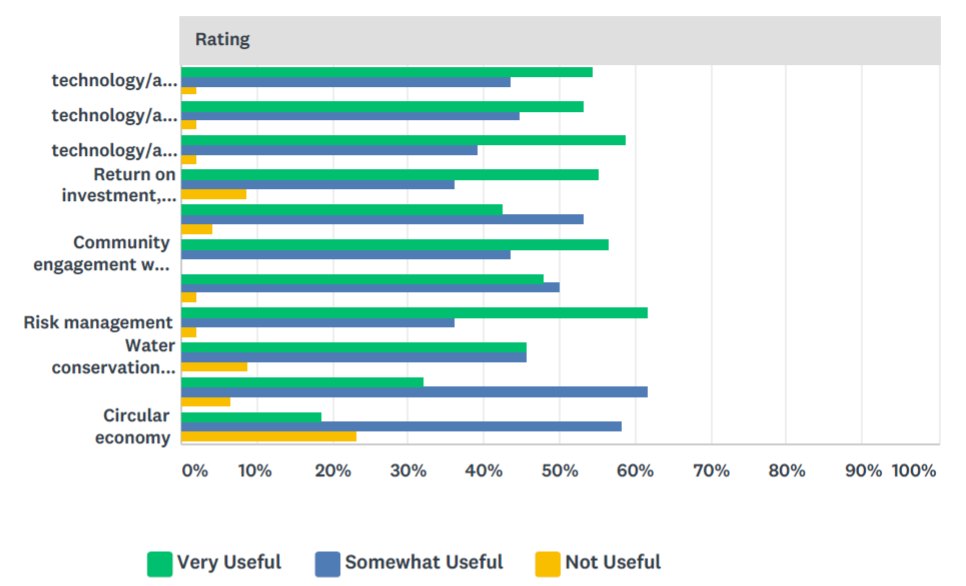
| Rating | Very Useful | Somewhat Useful | Not Useful | Total |
| technology/approach evaluation (such as a feasibility study) | 54.35% 25 |
43.48% 20 |
2.17% 1 |
46 |
| technology/approach optimization | 53.19% 25 |
44.68% 21 |
2.13% 1 |
47 |
| technology/approach implementation | 58.70% 27 |
39.13% 18 |
2.17% 1 |
46 |
| Return on investment, including cost of externalities (e.g. social cost of carbon, ecosystem services) | 55.32% 26 |
36.17% 17 |
8.51% 4 |
47 |
| Regulator collaboration and/or support | 42.55% 20 |
53.19% 25 |
4.26% 2 |
47 |
| Community engagement with the impacted public | 56.52% 26 |
43.48% 20 |
0.00% 0 |
46 |
| Stakeholder engagement to define sustainability metrics and tools | 47.83% 22 |
50.00% 23 |
2.17% 1 |
46 |
| Risk management | 61.70% 29 |
36.17% 17 |
2.13% 1 |
47 |
| Water conservation and reuse | 45.65% 21 |
45.65% 21 |
8.70% 4 |
46 |
| Materials use/management | 31.91% 15 |
61.70% 29 |
6.38% 3 |
47 |
| Circular economy | 18.60% 8 |
58.14% 25 |
23.26% 10 |
43 |
Q15 Does your state have any case studies/site examples that could be included in the ITRC GSR/Resiliency guidance?
Answered: 51 Skipped: 1
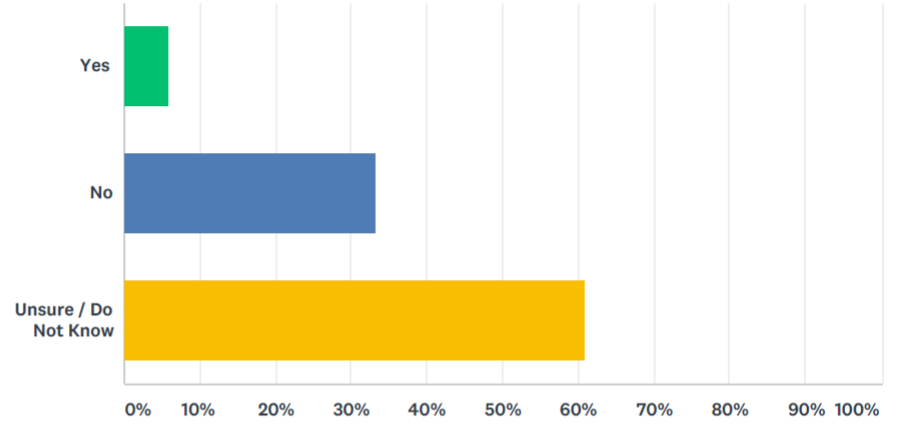
| ANSWER CHOICES | RESPONSES | ||
| Yes | 5.88% | 3 | |
| No | 33.33% | 17 | |
| Unsure / Do Not Know | 60.78% | 3 | |
| TOTAL | 51 | ||
Q16 Do you have any additional feedback that you would like to provide to help the ITRC GSR/R Team develop its guidance and other resources?
Answered: 20 Skipped: 32
